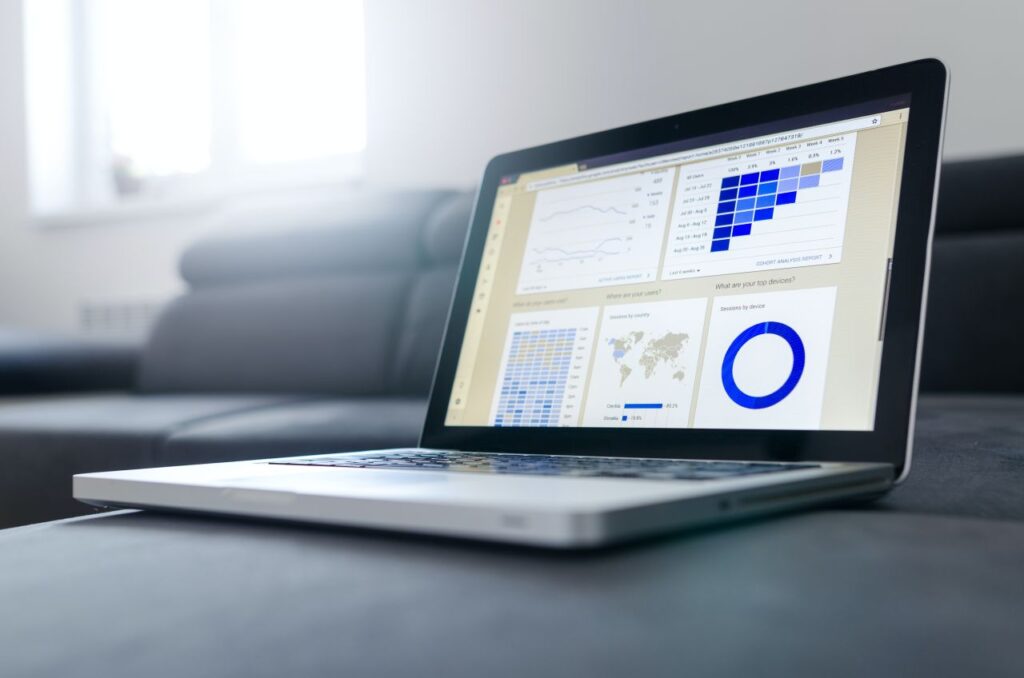Are you a small business owner overwhelmed by complicated and tedious accounting tasks? Have you ever wished there was an easier way to manage your books without having to worry about confusing details or strict deadlines?
Well, the answer could be cloud accounting solutions. This groundbreaking technology is gaining popularity in finance and promises to simplify and transform accounting for small businesses worldwide.
In this blog post, we'll explain cloud accounting and its benefits for businesses like you. Discover why transitioning from manual procedures to cloud-based software may be one of the finest business moves!
What Is This Thing Called The Cloud?
Next time you bank online, consider this. Logging into your bank account lets you examine your financial data on the cloud. The cloud also lets users access data and applications online from any device, location, or time. Thus, your desktop or portable hard drive is no longer the most important part of your computer or laptop.
What Exactly Is Cloud Accounting?
The phrase "cloud accounting." refers to online accounting. Internet connectivity replaces utilising the program from your computer's hard drive. If you've used online banking or email services like Gmail, Hotmail, or Yahoo, you've seen the promise of cloud computing.
Thus, to actively monitor your finances, you simply start your prefered online browser rather than download accounting software from a CD. Cloud accounting has several benefits, but let's focus on data security.
What Can Cause Data Loss And How Cloud Accounting Can Help?
Let's better understand the most prevalent factors that led to the loss of information and how you can avoid it by utilising reliable cloud accounting software.
1. Computers Are Vulnerable to Virus Attacks
I am aware that every astute businessperson uses the most advanced anti-virus software, but I also know that the developers of viruses are continually improving their techniques. When an infected USB device is placed into one of your PCs, that infection can spread.
If it's not a USB drive, the internet is the main source of infections today. Unfortunately, these viruses are tough to eliminate, and often, the only alternative available is to wipe the hard disc's contents completely.
Since nothing on your computer must be downloaded in the event of online software, your information is secure in the cloud (virtual servers), even if your computer has a virus. Therefore, in order to utilise the program, you only need to use a different computer.
2. Weak or No Access Control Are Serious Threats
Do you know of any more simple ways that your financial information can be lost? For example, on your computer, do not place any user access of any kind. If you are unaware of what this signifies, I can safely assume you do not have these measures installed in your workplace.
To open our laptops, we typically simply use a single password that is simple to remember (and easy to guess), which is frequently exchanged with other coworkers who are considered reliable. In addition, it is generally considered "safe" to transmit files (and movies and songs) using plugged-in USB drives.
It's possible for someone, even those with positive motives, to destroy essential files unintentionally. Moreover, if anybody copies crucial information from the computer, it is frequently difficult to discover who did it.
When accounting is done online, everything is kept on the local computer, and it is only possible to steal information or make copies of it if one has authorised access to the application.

3. Free Internet Can Sometimes Turn Out to Be Expensive
The internet in the workplace is used casually, and employees frequently don't pay any attention to protection. As a result, certain dangerous websites may secretly install malware on your office computer if a firewall or other internet security software does not secure it. This infection may subsequently cause your computer to become damaged and may result in the loss of information.
All reputable cloud accounting software vendors utilise a safe HTTPS connection with high degrees of encryption throughout their systems. Furthermore, firewall protection measures shield the information from any internet intrusions.
4. Backups Are Taken Only After Data Loss
We all know how crucial it is to back up our data, but we're not very good at safeguarding it.
Even backed-up data should be protected and organised so it can be recovered quickly. Unfortunately, even though they are aware of it, several company owners refrain from taking the precautions needed to back up their financial information.
The suppliers of cloud accounting software perform regular backups and have standardised procedures in place to recover the backups in the event that they are required.
5. Unforeseen Incidents
My best friend left his laptop bag in his car while at a store for a few minutes. I was gone for a few minutes. When he returned to his automobile, he was shocked by what had transpired.
A fracture in the window glass, and his laptop bag were missing. You may be unable to save your data if theft or fire occurs.
Companies lose billions of dollars to computer infections annually. Your financial data would be safe on the cloud even if you lost your laptop or desktop.
How Cloud Accounting Works
Users sign up for an online accounting software package subscription and then upload their bookkeeping data to the cloud. After that, they can access their accounts using any web browser or via an app downloaded to their mobile device.
The vast majority of customers link the programme to the bank account they utilise for their company, allowing for the automatic transfer of banking transactions from the bank to the books. Because of this, they won't have to enter as much info.
Benefits Of Cloud Accounting Software
Managing the financial aspects of your company online offers a number of benefits.
- Your bank may be able to send information regarding your sales, revenue, and purchases directly to your books, saving you the time-consuming task of typing the information.
- At any given time, you are able to view your current financial standing.
- Access for multiple users enables online collaboration with your staff and advisers to be simple and straightforward.
- As a web-based program, it never has to be downloaded or updated and automatically backs up your data.
- You may create a dashboard to show who owes you money, what payments are due, and how your cash flow is doing.
Traditional Accounting Software And Its Problems
The practice of accounting is an extremely important one that is dependent upon statistics and intricate equations. Thus, accountants were among the first to use computers for accounting. Therefore, computers could create ledgers, P&L accounts, and other account statements.
Standard accounting software is no longer the best option in today's fast-changing, high-risk company environment. Accountants nowadays aren't simply bookkeepers who are accountable for keeping a firm's record of transactions; rather, they are changing business consultants who monitor a company's financial position, anticipate potential development, and ensure the integrity of the firm's operations.
The Problem With Desktop-Based Accounting Software
- Because it needs continuous input regarding new operations and maintaining it in sync with real-time conditions demands continuous work, the information in desktop accounting software does not reflect the most recent activity. It's also only as good as the latest commercial programme you bought.
- It can usually only be installed on one computer, and data must be transferred using USB devices. This configuration exposes your data to theft. It also leaves your computer open to attack from harmful software and viruses, as these could be delivered to your system via the portable drive.
- There is a cap on the number of users, and only one individual is permitted access to the system. As a result, it is extremely difficult, if not impossible, to access financial or consumer information in huge firms with several critical people.
- Storing backups will be more costly and take up more of your time.
- It will cost you money and effort, and your machine will be down while you upgrade the software.
- The customer support service is incredibly slow, and it will typically cost you money for on-site visits as well as other fees.

The Cloud Makes Tax Time A Breeze
Cloud users may contact their accountants whenever they have a query or problem instead of hiring a costly CPA who can't help with technological issues.
This means you won't have to wait for your IT staff or a paid IT specialist to help you. You won't have to wait.
There's no reason not to adopt cloud accounting, especially if some of these benefits apply to your company. There is no reason not to adopt cloud accounting.
The Cloud Is A Package Of Excellent Features
Accounting on the cloud offers companies accessibility to data in real time, which is essential for arriving at well-informed choices. For this reason, cloud accounting is an excellent choice for companies.
Putting your financial records in the cloud enables you to combine your accounting software with the other tools you use for your company. You will now be able to begin automating your processes and have all your information recorded into your ledgers and books without requiring assistance from a human.
Because of this, the number of mistakes that might occur throughout data entry and transfer is decreased, ultimately resulting in more detailed documentation. Last but not least, with cloud accounting, giving or revoking a person's access to data is simple. This comes in handy when you are either integrating a new account or offboarding a former colleague because it allows you to manage record accessibility quickly and easily.
Flexibility Of The Cloud
Recently, many businesses have integrated cloud computing into their operations. Internet access to computer services is "cloud computing," often called "on-demand" computing. Companies invest much in software development and deployment to improve efficiency.
Cloud accounting lets your firm employ software as a web service. Cloud accounting also makes cloud storage and transmission safe. Flexibility is a major benefit of cloud accounting. With this solution, you and your staff may work remotely.
Workers might work from home or in the field. To save extra money, you might minimise the number of workstations and let certain employees work from home. Cloud accounting lets you track your company's activity in depth. For real-time activity updates, all you need is a fast internet connection.
The Cloud Is A Disaster Recovery Solution
Control is an essential component of the achievement of success in any company. However, despite the fact that an organisation's internal processes might well be effectively managed, it is impossible to tame outside influences, which can result in major decreases in the company and losses in efficiency.
Even if you can't control external factors, cloud accounting can accelerate recovery. Cloud-hosted accounting software allows users to quickly access crucial data in the case of power outages and natural disasters.
Enter Cloud Accounting: The Ultimate Solution For Business Owners
There is a lot of excitement surrounding the concept of "cloud accounting" and how accounting software in the cloud is revolutionising companies worldwide. If you haven't switched to Cloud Accounting, here are several reasons. It is a cutting-edge web-based solution that lets you access your accounting software from any internet-connected device. Accounting online is another term that certain individuals use to relate to it. If you look around, you'll find numerous cloud services we use, like online banking, email services, file-sharing websites, Netflix, Google Docs, Dropbox, and many others.
There's a collection of networked computing in a cloud computing ecosystem. The primary servers house a program, application, or data, and it is available to all linked users through the Internet. Every device that can connect to the internet, such as a personal computer (desktop or laptop), tablet, or smartphone, can view the hosted software.
A data centre is the location of the cloud-based accounting software servers. Users from any corner of the globe can access the program on their personal computers or mobile devices by logging into their accounts through a web browser.
In point of fact, cloud accounting software is such a wonderful innovation that it has resulted in widespread adoption in the worldwide accounting business in the 21st century. This acceptance has been brought about by cloud accounting software being so fantastic.
The modern accountant and the modern businessman can now collaborate on the same system concurrently, regardless of where they happen to be located. Accounting professionals are no longer required to continually enter their customers' information into their own files and then move that information from one system to the next because cloud accounting software has removed this requirement.
The accounting software business worldwide is flooded with solutions that provide hundreds of high-value features and make cloud computing easier.
However, if you want to integrate cloud computing software into your firm, you must carefully consider its features. In recent years, cloud computing software has grown in popularity.
Why The Cloud And Accounting Software Are The Perfect Match
You can utilise cloud-based software from whatever device has internet access. For example, online accounting software enables owners of small companies to link to their information and their accountants. The application may communicate with a wide range of company programmes developed by other companies. It's easy to use, scalable, and affordable.
Cloud computing does not need downloading and running applications on a desktop. The program is purchased through a monthly subscription.
Conclusion
It makes no difference what industry category your company falls under. However, with cloud accounting, you may focus more on the things that are important to you and reach new heights in terms of financial management.
Even though it might appear like a secondary item in the starting period of a new enterprise, optimal management of resources and precise accounting will gain a centre-stage role as your organisation grows in order to ensure that your firm is successful.
If, on the other hand, your company is already at that point and you are seeking accounting experts to help game up in the administration of finances and accounts, you should look for suppliers who offer specialised accounting services for small enterprises.
Also, ensure you choose a trustworthy one that will assist you in getting the most out of the cloud accounting software you have purchased.

Content Summary
- Are you a small business owner overwhelmed by complicated and tedious accounting tasks? Well, the answer could be cloud accounting solutions.
- This groundbreaking technology is gaining popularity in finance and promises to simplify and transform accounting for small businesses worldwide.
- Discover why transitioning from manual procedures to cloud-based software may be one of the finest business moves!
- Logging into your bank account lets you examine your financial data on the cloud.
- The cloud also lets users access data and applications online from any device, location, or time.
- Thus, your desktop or portable hard drive is no longer the most important part of your computer or laptop.
- Internet connectivity replaces utilising the program from your computer's hard drive.
- If you've used online banking or email services like Gmail, Hotmail, or Yahoo, you've seen the promise of cloud computing.
- Thus, to actively monitor your finances, you simply start your prefered online browser rather than download accounting software from a CD.
- Cloud accounting has several benefits, but let's focus on data security.
- For example, on your computer, do not place any user access of any kind.
- If you are unaware of what this signifies, I can safely assume you do not have these measures installed in your workplace.
- Moreover, if anybody copies crucial information from the computer, it is frequently difficult to discover who did it.
- When accounting is done online, everything is kept on the local computer, and it is only possible to steal information or make copies of it if one has authorised access to the application.3.
- The internet in the workplace is used casually, and employees frequently don't pay any attention to protection.
- As a result, certain dangerous websites may secretly install malware on your office computer if a firewall or other internet security software does not secure it.
- This infection may subsequently cause your computer to become damaged and may result in the loss of information.
- All reputable cloud accounting software vendors utilise a safe HTTPS connection with high degrees of encryption throughout their systems.
- Furthermore, firewall protection measures shield the information from any internet intrusions.
- We all know how crucial it is to back up our data, but we're not very good at safeguarding it.
- Even backed-up data should be protected and organised so it can be recovered quickly.
- Unfortunately, even though they are aware of it, several company owners refrain from taking the precautions needed to back up their financial information.
- The suppliers of cloud accounting software perform regular backups and have standardised procedures in place to recover the backups in the event that they are required.
- You may be unable to save your data if theft or fire occurs.
- Your financial data would be safe on the cloud even if you lost your laptop or desktop.
- Users sign up for an online accounting software package subscription and then upload their bookkeeping data to the cloud.
- After that, they can access their accounts using any web browser or via an app downloaded to their mobile device.
- The vast majority of customers link the programme to the bank account they utilise for their company, allowing for the automatic transfer of banking transactions from the bank to the books.
- Managing the financial aspects of your company online offers a number of benefits.
- At any given time, you are able to view your current financial standing.
- Access for multiple users enables online collaboration with your staff and advisers to be simple and straightforward.
- As a web-based program, it never has to be downloaded or updated and automatically backs up your data.
- Thus, accountants were among the first to use computers for accounting.
- Standard accounting software is no longer the best option in today's fast-changing, high-risk company environment.
- Because it needs continuous input regarding new operations and maintaining it in sync with real-time conditions demands continuous work, the information in desktop accounting software does not reflect the most recent activity.
- It can usually only be installed on one computer, and data must be transferred using USB devices.
- This configuration exposes your data to theft.
- There is a cap on the number of users, and only one individual is permitted access to the system.
- There's no reason not to adopt cloud accounting, especially if some of these benefits apply to your company.
- There is no reason not to adopt cloud accounting.
- Accounting on the cloud offers companies accessibility to data in real time, which is essential for arriving at well-informed choices.
- For this reason, cloud accounting is an excellent choice for companies.
- Putting your financial records in the cloud enables you to combine your accounting software with the other tools you use for your company.
- Last but not least, with cloud accounting, giving or revoking a person's access to data is simple.
- Recently, many businesses have integrated cloud computing into their operations.
- Internet access to computer services is "cloud computing," often called "on-demand" computing.
- Cloud computing lets your firm employ software as a web service.
- Flexibility is a major benefit of cloud computing.
- Cloud computing lets you track your company's activity in depth.
- Even if you can't control external factors, cloud accounting can accelerate recovery.
- Cloud-hosted accounting software allows users to quickly access crucial data in the case of power outages and natural disasters.
- There is a lot of excitement surrounding the concept of "cloud accounting" and how accounting software in the cloud is revolutionising companies worldwide.
- If you haven't switched to Cloud Accounting, here are several reasons.
- It is a cutting-edge web-based solution that lets you access your accounting software from any internet-connected device.
- There's a collection of networked computing in a cloud computing ecosystem.
- In point of fact, cloud accounting software is such a wonderful innovation that it has resulted in widespread adoption in the worldwide accounting business in the 21st century.
- This acceptance has been brought about by cloud accounting software being so fantastic.
- The accounting software business worldwide is flooded with solutions that provide hundreds of high-value features and make cloud computing easier.
- However, if you want to integrate cloud computing software into your firm, you must carefully consider its features.
- In recent years, cloud computing software has grown in popularity.
- For example, online accounting software enables owners of small companies to link to their information and their accountants.
- However, with cloud accounting, you may focus more on the things that are important to you and reach new heights in terms of financial management.
- Even though it might appear like a secondary item in the starting period of a new enterprise, optimal management of resources and precise accounting will gain a centre-stage role as your organisation grows in order to ensure that your firm is successful.
- If, on the other hand, your company is already at that point and you are seeking accounting experts to help game up in the administration of finances and accounts, you should look for suppliers who offer specialised accounting services for small enterprises.
- Also, ensure you choose a trustworthy one that will assist you in getting the most out of the cloud accounting software you have purchased.
Frequently Asked Questions
Cloud accounting uses distant servers to manage firm finances. Unlike traditional accounting, which requires installation at the software's location, you may view your financial data from anywhere with an internet connection.
Data entry, bank reconciliation, and report preparation are automated using cloud accounting. Automation lowers human error and saves time. Real-time data also keeps financial reports current, speeding up decision-making.
Cloud accounting solutions, like online banking, safeguard your data with robust encryption and numerous levels. Providers spend extensively on security to protect your data from unauthorised access, data breaches, and other cyber dangers.
Absolutely. Cloud accounting lets numerous users access the same financial data, so your staff, accountant, and bookkeeper can collaborate from anywhere. This increases teamwork and keeps everyone informed.
Many cloud accounting software solutions integrate with payroll, inventory, and CRM systems. This allows data to flow between systems, minimising manual data transmission and delivering a more complete business picture.
